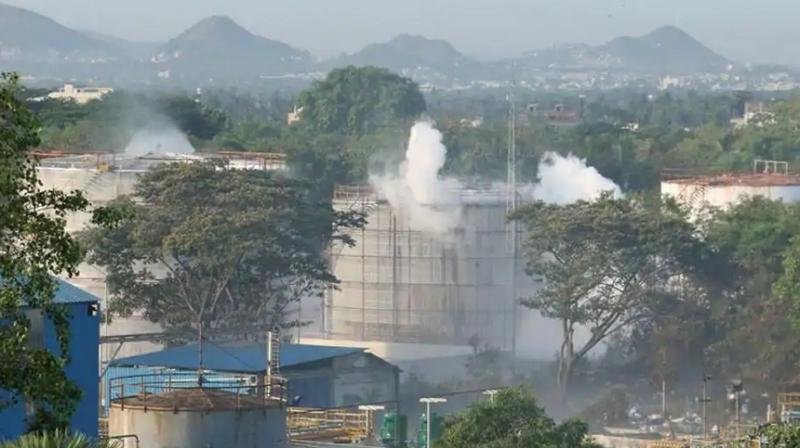Vizag Gas Leak: The Call for Absolute Liability

Gas leakage at an LG Polymer plant in Visakhapatnam, Andhra Pradesh has claimed more than ten lives (still counting) with twenty seriously injured and more than a thousand ill. One interesting and contested fact in the episode is that the National Green Tribunal (NGT) applied the principle of “Strict Liability” instead of “Absolute liability” which would have been more appropriate.
The incident makes us hearken back to a resemblant gas tragedy of Bhopal in 1984 that had taken a toll on 4000 lives and incapacitated 1,00,000 others. The case dumbfounded the legislative machinery of the country which didn’t have any tenacious law to decide the compensation. As the incident occurred at an American company by the name of Union Carbide Corporation, a number of petitions were filed in the USA by the relatives of victims and social activists. Eventually, the government of India, deriving authority from the Bhopal Gas Leak Disaster Processing Claims Act, instituted a case in the US against the Union Carbide India Ltd. (hereinafter “UCIL”) as a parens patriae ( the parent of the country). The Indian government could not maintain its lawsuit and the Court disposed of the petition asking the Indian Courts to “pass judgment for its own people”.
For the Indian judiciary, the tragedy was an unprecedented opportunity that it requires to seize to create a global impression of its efficiency and credibility, a composition it lost during the national emergency and in its aftermath.
When the impugn case was sub juice, another mild but horrible incident happened at Shriram Foods Delhi where an oleum gas leakage arrested the life of an advocate among others. This case laid down the founding stone of Absolute liability, which is reckoned as one of the greatest achievements of judicial activism in India.

The Tort of Absolute Liability
Torts is an uncodified law in India that generally follows the common law interpretations on the subject. For damage caused by the industrial catastrophes, English law has a celebrated principle of Strict liability laid down in Rylands v. Fletcher. This doctrine says that ” If any person who, for his own purpose, brings to his land something dangerous that is likely to cause mischief if escape must keep it at his own peril”. The principle laid down in 1868 requires certain criteria to be fulfilled before carrying out, they are:
- The thing must be dangerous.
- There must be a non-natural use of land.
- The thing must escape.
- Damage or Mischief must be caused.
The Strict liability principle provides for certain exceptions, like, Act of God, an act of the third party, consent of the injured, statutory authority, and default of the person injured.
These computations make a way for the defendant to evade liability by debunking any one of these propositions. Therefore, both the UCIL and Shriram Foods could have bypassed the liability for the reasons being the natural use of land, the act of God, or the act of a stranger. The Supreme Court had preferred to commend the “complete justice” to labourers who lost their lives as which could only have been possible by a preeminent innovation.
The Supreme Court noted the same in the oleum gas case (M.C Mehta v. UOI) and labeled the Strict liability as an outmoded theory that was formulated when the “developments of science and technology had not taken place” and has no relevance with the present times. The court said that “Law has to grow to satisfy the needs of the fast-changing society and keep abreast with the economic developments taking place in the country”. ” Law cannot afford to remain static”.
The Supreme Court had invoked its power under Article 32 of the Indian constitution that allows it to devise any procedure appropriate for the particular purpose of the proceedings and protection of enforcement of the Fundamental Rights. The court dissented from the English law and propounded the doctrine of Absolute liability establishing that “it has to build upon its own jurisprudence”.
Absolute liability explores that “If an industry or enterprise is engaged in some inherently dangerous activity from which it is deriving commercial gain and that activity is capable of causing catastrophic damage then the industry officials are absolutely liable to pay compensation to the aggrieved parties. The industry cannot plead that all safety measures were taken care of by them and that there was negligence on their part. They will not be allowed any exceptions neither can they take up any defense like that of ‘Act of God’ or ‘Act of a Stranger”. There are just two requirements; first, the defendant must engage in a hazardous activity and the plaintiff has suffered an injury due to this inherently dangerous pursuit, second, the enterprise alone has the resources to discover and guard against the dangers. It explicitly nullifies the availability of any exception provided in Strict Liability. It is a liability without exceptions.

Should LG Polymers be Strictly Liable for Vizag Gas Tragedy?
Vizag Tragedy is a reflector of Bhopal Tragedy with comparatively less devastation. The gas leaked is Styrene which is a noxious gas hence an inherently dangerous activity was going on. The notable thing here is that the gas did escape and this could possibly be the reason that NGT has applied Strict Liability. NGT has awarded Rs.50 crore as an initial compensation. It has also set up an expert committee to overall examine and submit the report. Though there is a possibility of an increase in the damages, the application of outmoded Strict Liability is received with anxieties in legal parlance. The question maintains that if the Tragedy had fulfilled all the conditions of Absolute liability, why did the NGT cite an obsolete law.
Strict liability has certain additional chasms like the one concerned with monetary compensation. While Strict liability calls for compensatory damages, Absolute liability mandates exemplary damages meaning thereby a monetary reparation much more than the injury done. In this way Absolute liability acts as a deterrent.
In the Bhopal Gas Tragedy, the Supreme Court had ordered the UCIL to pay USD 470 million (Rs. 750 crores), highest in Indian history. In Klaus Mittelbachert v. East India Hotels Ltd., the court granted exemplary damages to a German co-pilot who got amputated and died while swimming in an ill-maintained swimming pool in a hotel in Delhi. The rule is followed by M.P High Court in Jagdish v. Naresh, where even admitting negligence, the court applied M.C Mehta and granted exemplary damages.
Conclusion
We should acclaim the Indian judiciary for its remarkable job with special thanks to Justice P.N Bhagwati whose prudence in M.C Mehta v. Union of India unfolded a new chapter in the law books around the world. Bhopal and Oleum Tragedies are, to an extent, repeated in Vizag today. The Indian judiciary and legislature have various options like the Occupiers Liability Act, 1947, Environment Protection Act, 1987, Strict liability, and Negligence in Torts, among others. But, the most effective tool in the hands of the Judiciary is the self-made doctrine of Absolute liability which not only satisfies the principles of justice, equity, and good conscience but also the essence of sacrosanct Fundamentals Rights embedded in the Constitution. Absolute liability is the need of the hour.



















